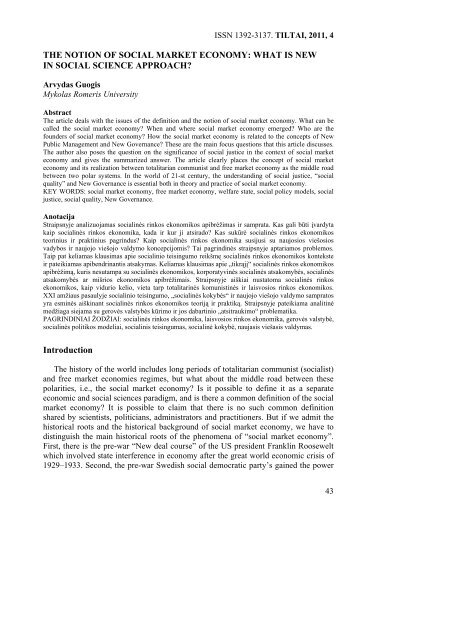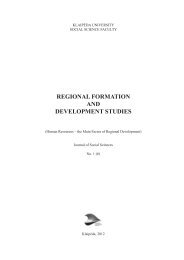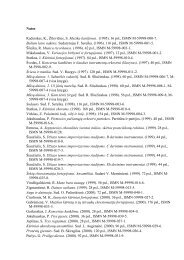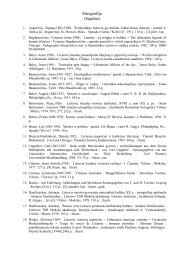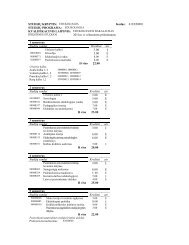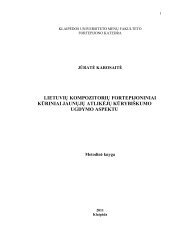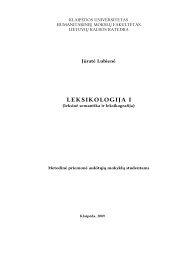2011,4 (57) - KlaipÄdos universitetas
2011,4 (57) - KlaipÄdos universitetas
2011,4 (57) - KlaipÄdos universitetas
Create successful ePaper yourself
Turn your PDF publications into a flip-book with our unique Google optimized e-Paper software.
ISSN 1392-3137. TILTAI, <strong>2011</strong>, 4<br />
THE NOTION OF SOCIAL MARKET ECONOMY: WHAT IS NEW<br />
IN SOCIAL SCIENCE APPROACH?<br />
Arvydas Guogis<br />
Mykolas Romeris University<br />
Abstract<br />
The article deals with the issues of the definition and the notion of social market economy. What can be<br />
called the social market economy? When and where social market economy emerged? Who are the<br />
founders of social market economy? How the social market economy is related to the concepts of New<br />
Public Management and New Governance? These are the main focus questions that this article discusses.<br />
The author also poses the question on the significance of social justice in the context of social market<br />
economy and gives the summarized answer. The article clearly places the concept of social market<br />
economy and its realization between totalitarian communist and free market economy as the middle road<br />
between two polar systems. In the world of 21-st century, the understanding of social justice, “social<br />
quality” and New Governance is essential both in theory and practice of social market economy.<br />
KEY WORDS: social market economy, free market economy, welfare state, social policy models, social<br />
justice, social quality, New Governance.<br />
Anotacija<br />
Straipsnyje analizuojamas socialinės rinkos ekonomikos apibrėžimas ir samprata. Kas gali būti įvardyta<br />
kaip socialinės rinkos ekonomika, kada ir kur ji atsirado? Kas sukūrė socialinės rinkos ekonomikos<br />
teorinius ir praktinius pagrindus? Kaip socialinės rinkos ekonomika susijusi su naujosios viešosios<br />
vadybos ir naujojo viešojo valdymo koncepcijomis? Tai pagrindinės straipsnyje aptariamos problemos.<br />
Taip pat keliamas klausimas apie socialinio teisingumo reikšmę socialinės rinkos ekonomikos kontekste<br />
ir pateikiamas apibendrinantis atsakymas. Keliamas klausimas apie „tikrąjį“ socialinės rinkos ekonomikos<br />
apibrėžimą, kuris nesutampa su socialinės ekonomikos, korporatyvinės socialinės atsakomybės, socialinės<br />
atsakomybės ar mišrios ekonomikos apibrėžimais. Straipsnyje aiškiai nustatoma socialinės rinkos<br />
ekonomikos, kaip vidurio kelio, vieta tarp totalitarinės komunistinės ir laisvosios rinkos ekonomikos.<br />
XXI amžiaus pasaulyje socialinio teisingumo, „socialinės kokybės“ ir naujojo viešojo valdymo sampratos<br />
yra esminės aiškinant socialinės rinkos ekonomikos teoriją ir praktiką. Straipsnyje pateikiama analitinė<br />
medžiaga siejama su gerovės valstybės kūrimo ir jos dabartinio „atsitraukimo“ problematika.<br />
PAGRINDINIAI ŽODŽIAI: socialinės rinkos ekonomika, laisvosios rinkos ekonomika, gerovės valstybė,<br />
socialinės politikos modeliai, socialinis teisingumas, socialinė kokybė, naujasis viešasis valdymas.<br />
Introduction<br />
The history of the world includes long periods of totalitarian communist (socialist)<br />
and free market economies regimes, but what about the middle road between these<br />
polarities, i.e., the social market economy? Is it possible to define it as a separate<br />
economic and social sciences paradigm, and is there a common definition of the social<br />
market economy? It is possible to claim that there is no such common definition<br />
shared by scientists, politicians, administrators and practitioners. But if we admit the<br />
historical roots and the historical background of social market economy, we have to<br />
distinguish the main historical roots of the phenomena of “social market economy”.<br />
First, there is the pre-war “New deal course” of the US president Franklin Roosewelt<br />
which involved state interference in economy after the great world economic crisis of<br />
1929–1933. Second, the pre-war Swedish social democratic party’s gained the power<br />
43


